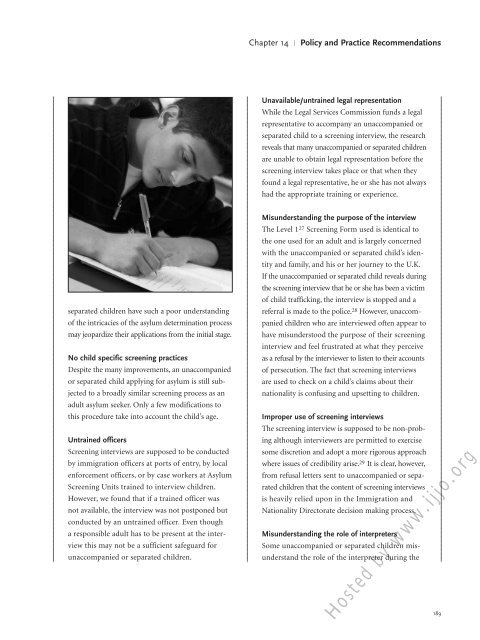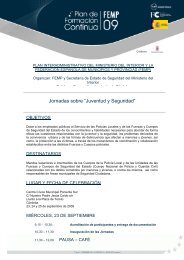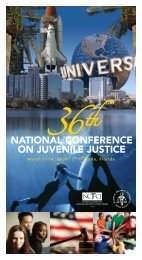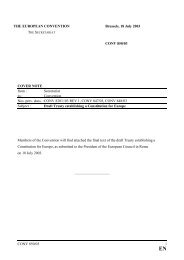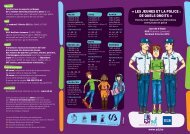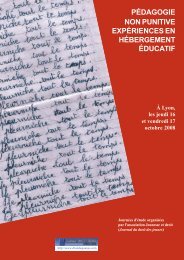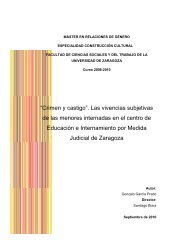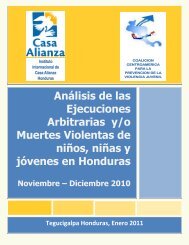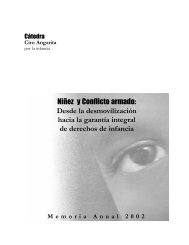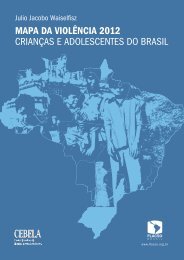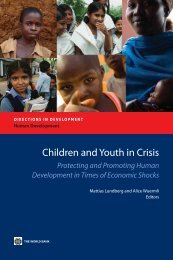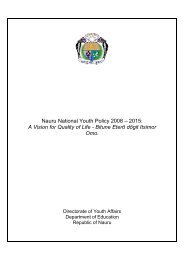Hosted by www.ijjo.org
Hosted by www.ijjo.org
Hosted by www.ijjo.org
You also want an ePaper? Increase the reach of your titles
YUMPU automatically turns print PDFs into web optimized ePapers that Google loves.
Chapter 14 | Policy and Practice Recommendations<br />
Unavailable/untrained legal representation<br />
While the Legal Services Commission funds a legal<br />
representative to accompany an unaccompanied or<br />
separated child to a screening interview, the research<br />
reveals that many unaccompanied or separated children<br />
are unable to obtain legal representation before the<br />
screening interview takes place or that when they<br />
found a legal representative, he or she has not always<br />
had the appropriate training or experience.<br />
separated children have such a poor understanding<br />
of the intricacies of the asylum determination process<br />
may jeopardize their applications from the initial stage.<br />
No child specific screening practices<br />
Despite the many improvements, an unaccompanied<br />
or separated child applying for asylum is still subjected<br />
to a broadly similar screening process as an<br />
adult asylum seeker. Only a few modifications to<br />
this procedure take into account the child’s age.<br />
Untrained officers<br />
Screening interviews are supposed to be conducted<br />
<strong>by</strong> immigration officers at ports of entry, <strong>by</strong> local<br />
enforcement officers, or <strong>by</strong> case workers at Asylum<br />
Screening Units trained to interview children.<br />
However, we found that if a trained officer was<br />
not available, the interview was not postponed but<br />
conducted <strong>by</strong> an untrained officer. Even though<br />
a responsible adult has to be present at the interview<br />
this may not be a sufficient safeguard for<br />
unaccompanied or separated children.<br />
Misunderstanding the purpose of the interview<br />
The Level 1 27 Screening Form used is identical to<br />
the one used for an adult and is largely concerned<br />
with the unaccompanied or separated child’s identity<br />
and family, and his or her journey to the U.K.<br />
If the unaccompanied or separated child reveals during<br />
the screening interview that he or she has been a victim<br />
of child trafficking, the interview is stopped and a<br />
referral is made to the police. 28 However, unaccompanied<br />
children who are interviewed often appear to<br />
have misunderstood the purpose of their screening<br />
interview and feel frustrated at what they perceive<br />
as a refusal <strong>by</strong> the interviewer to listen to their accounts<br />
of persecution. The fact that screening interviews<br />
are used to check on a child’s claims about their<br />
nationality is confusing and upsetting to children.<br />
Improper use of screening interviews<br />
The screening interview is supposed to be non-probing<br />
although interviewers are permitted to exercise<br />
some discretion and adopt a more rigorous approach<br />
where issues of credibility arise. 29 It is clear, however,<br />
from refusal letters sent to unaccompanied or separated<br />
children that the content of screening interviews<br />
is heavily relied upon in the Immigration and<br />
Nationality Directorate decision making process.<br />
Misunderstanding the role of interpreters<br />
Some unaccompanied or separated children misunderstand<br />
the role of the interpreter during the<br />
<strong>Hosted</strong> <strong>by</strong> <strong>www</strong>.<strong>ijjo</strong>.<strong>org</strong><br />
189


